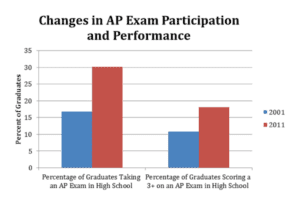Many of today’s high-wage jobs and fastest growing occupations require science, technology, engineering, and math (STEM) skills. There is general agreement that strengthening STEM teaching and learning is key to workforce readiness and growth of the U.S. economy. Tomorrow’s thinkers will need STEM skills to develop innovative solutions to the world’s increasingly complex problems. Yet, according to the National Center for Education Statistics, the number of college students with STEM degrees has declined from 24 percent in 1985 to 18 percent in 2009.
Further, while the College Board’s Advanced Placement (AP) program has seen a doubling in participation from 2001 to 2011 among U.S. high school students, we’ve seen that this doesn’t necessarily lead to more college graduates pursuing STEM careers. What results is our nation’s continued inability to meet the demand for qualified scientists and engineers .
According to a recent report by the President’s Council on Jobs and Competitiveness, more than three million job openings in the U.S. go unfilled for months on end because most employers say they’re having difficulty finding and hiring qualified STEM workers.
Let’s Take a Closer Look

The graph to the right illustrates the increase in AP exam participation and performance over this 10-year span. The percentage of graduates taking an AP exam in a U.S. high school increased by 13.4 percent, and the percent of graduates succeeding (scoring a 3 or higher out of a possible maximum of 5) on an AP exam rose by 7.3 percent. In 2011, more graduates scored a 3 or higher than the total number of students who took AP exams in 2001. (Source)
The Role of Inquiry-based Science Courses
In 2002, The National Research Council released a report critical of AP science course curriculum for failing to incorporate advances in education research. Following that report, with funding from the National Science Foundation (NSF), the College Board revised AP biology and chemistry courses to emphasize critical thinking and problem solving. The redesigned curriculum is aligned with the Next-Generation Science Standards, which were developed by a number of national research and teaching organizations to provide states with a set of internationally benchmarked science standards.
Inquiry-based AP biology courses reflecting the Next-Generation Science Standards launched in 2012; other science subjects will be added in 2013 and 2014. All of the AP courses are designed to match high-quality introductory college courses that focus on exploration of the big ideas of a discipline. This teaching model emphasizes conceptual understanding and application, as opposed to simply acquiring knowledge across a range of topics.
The redesigned AP science curriculum also reflects policies to increase minority student numbers, as they continue to be underrepresented in AP classes. For example, African Americans make up about four percent of the AP student population, while they represent more than 14 percent of total high school students. Some school districts are opening up AP classes to all students and some states, such as Arkansas, require all high schools to offer AP classes to students in each of the four core areas of math, English, science, and social studies.
Opening Access to AP Classes
SRI researchers are collaborating with the Evans School of Public Affairs at The University of Washington and with George Washington University on a four-year study that will provide the first experimental evidence of the effects of taking inquiry-based science courses. The study team will recruit and provide resources to 40 schools to launch new inquiry-based AP biology or chemistry courses, and will randomly assign students within the participating schools to take the newly offered courses.
The researchers will look at how students engage in scientific inquiry and their overall educational performance and aspirations. The SRI team will conduct surveys, interviews, and observations of teachers and students in the AP courses, and will provide real-time feedback to educators.
Our Hypothesis
Our study team expects that students taking an inquiry-based AP biology or chemistry course will be more interested and competent in scientific inquiry. In turn, we believe students will be more likely to enroll in and complete college, and pursue STEM careers. We anticipate that our study findings will strengthen the teaching of advanced science courses in high school. We look forward to reporting back when results are available.
Related
Ray McGhee podcast, Nov. 13, 2012



